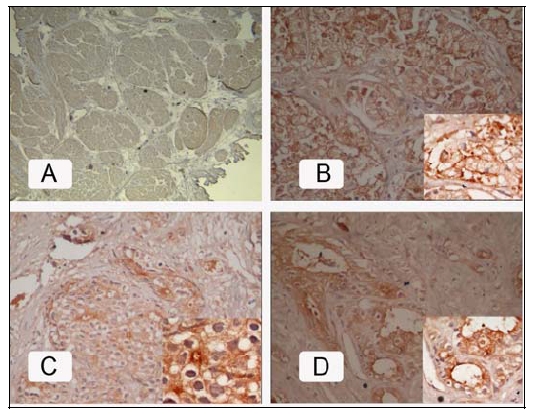PSMA (FOLH1) Mouse Monoclonal Antibody [Clone ID: 4H11]
Other products for "FOLH1"
Specifications
| Product Data | |
| Clone Name | 4H11 |
| Applications | ELISA, IHC |
| Recommended Dilution | ELISA. Immunohistochemistry on Paraffin Sections: PSMA were detected in Paraffin-Embedded Human prostatic tissue and Prostatic Carcinoma tissue with Monoclonal PSMA antibody (Cat#AM09256PU-N, Clone: 4H11). |
| Reactivities | Human |
| Host | Mouse |
| Isotype | IgG2b |
| Clonality | Monoclonal |
| Immunogen | Crude membrane protein extraction from PSMA expression LNCap cells, and a PSMA derived peptide (ESKVDPSKA) coupled with KLH. |
| Specificity | This antibody is reactive to PSMA expression LNCap cells and the PSMA peptide in EIA. In IHC staining experiment, this antibody reacts to human prostatic carcinoma tissue, but not to normal prostatic tissue. Little or no cross-reactivity to normal prostatic tissue. |
| Formulation | 0.01M PBS, pH 7.0 without preservatives. State: Aff - Purified State: Lyophilized purified IgG fraction. |
| Reconstitution Method | Restore with Double distillated water to adjust the final concentration to 1.0 mg/ml. |
| Purification | Affinity Chromatography on Protein G. |
| Conjugation | Unconjugated |
| Storage | Store the antibody (in aliquots) at -20°C. Avoid repeated freezing and thawing. |
| Stability | Shelf life: one year from despatch. |
| Gene Name | Homo sapiens folate hydrolase 1 (FOLH1), transcript variant 2 |
| Database Link | |
| Background | Prostate Specific Membrane Antigen (PMSA, FOLH1) is a type II transmembrane glycoprotein belonging to the M28 peptidase family. Three functionally distinct proteins are encoded, including folylpoly-gamma-glutamate carboxypeptidase in the intestine, N-acetylated alpha-linked acidic dipeptidase 1 in the brain, and prostate-specific membrane antigen in the prostate. A mutation in the intestinal form may be associated with impaired intestinal absorption of dietary folates, resulting in low blood folate levels and consequent hyperhomocysteinemia. The form expressed in the brain may be involved in a number of pathological conditions associated with glutamate excitotoxicity. The prostate form is up-regulated in cancerous cells and is used as an effective diagnostic and prognostic indicator of prostate cancer. This gene likely arose from a duplication event of a nearby chromosomal region. Alternative splicing gives rise to multiple transcript variants. |
| Synonyms | Glutamate carboxypeptidase 2, Folate hydrolase 1, Prostate-specific membrane antigen, FOLH, NAALAD1, PSM, GCP2, NAALAdase |
| Reference Data | |
| Protein Families | Druggable Genome, Protease, Transmembrane |
Documents
| Product Manuals |
| FAQs |
{0} Product Review(s)
0 Product Review(s)
Submit review
Be the first one to submit a review
Product Citations
*Delivery time may vary from web posted schedule. Occasional delays may occur due to unforeseen
complexities in the preparation of your product. International customers may expect an additional 1-2 weeks
in shipping.






























































































































































































































































 Germany
Germany
 Japan
Japan
 United Kingdom
United Kingdom
 China
China



